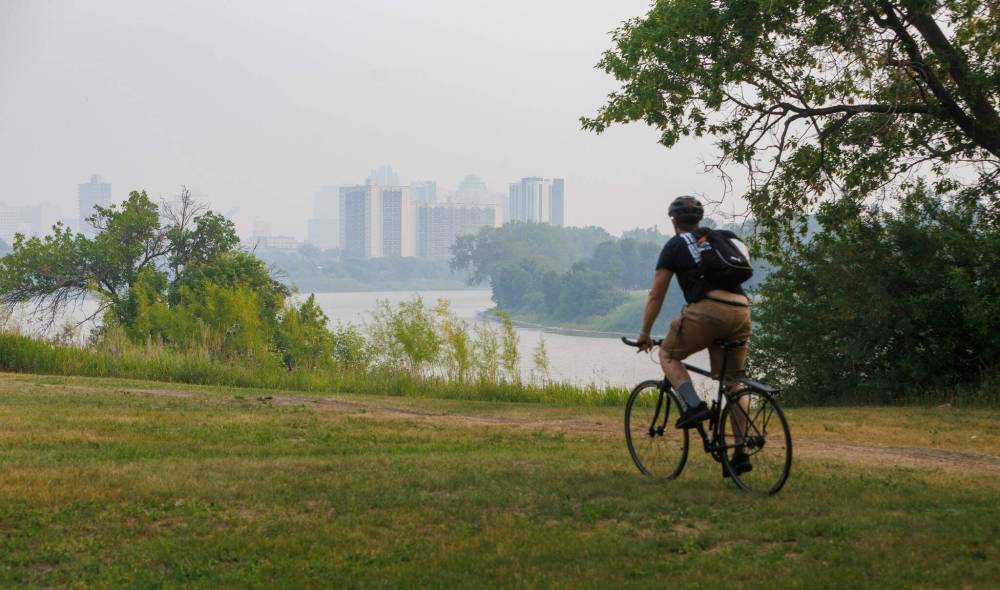Wildfire smoke over Winnipeg akin to having a cigarette
Advertisement
Read this article for free:
or
Already have an account? Log in here »
To continue reading, please subscribe:
Monthly Digital Subscription
$0 for the first 4 weeks*
- Enjoy unlimited reading on winnipegfreepress.com
- Read the E-Edition, our digital replica newspaper
- Access News Break, our award-winning app
- Play interactive puzzles
*No charge for 4 weeks then price increases to the regular rate of $19.00 plus GST every four weeks. Offer available to new and qualified returning subscribers only. Cancel any time.
Monthly Digital Subscription
$4.75/week*
- Enjoy unlimited reading on winnipegfreepress.com
- Read the E-Edition, our digital replica newspaper
- Access News Break, our award-winning app
- Play interactive puzzles
*Billed as $19 plus GST every four weeks. Cancel any time.
To continue reading, please subscribe:
Add Free Press access to your Brandon Sun subscription for only an additional
$1 for the first 4 weeks*
*Your next subscription payment will increase by $1.00 and you will be charged $16.99 plus GST for four weeks. After four weeks, your payment will increase to $23.99 plus GST every four weeks.
Read unlimited articles for free today:
or
Already have an account? Log in here »
Even if you never smoked a cigarette, you basically had at least one on Friday because of dense smoke from wildfires wafting over Winnipeg.
Winnipeg reached its highest smoke particulate count of the season between 5 a.m. and 6 a.m. For much of the day, Environment Canada air quality warnings urged everyone to limit time outdoors and reschedule or cancel outdoor sports and activities.
Christopher Pascoe, an associate professor in the department of physiology and pathophysiology at the University of Manitoba, said the city’s particulate count was at 372.6 micrograms per millilitre cubed.

MIKE DEAL / FREE PRESS
Wildfire smoke shrouds downtown high-rises as a cyclist makes their way along a bike path beside the Red River Friday morning.
“The current Canadian limit for daily exposure is a total of 27 — that’s 15 times higher than the acceptable daily limit,” Pascoe said.
“At that time, if you were out in it for eight hours, that would have been the equivalent to smoking six and a half cigarettes.”
Pascoe said by mid-morning the particulate count had dropped more than half, to 146.8.
“That’s still seven times the Canadian daily limit and, if you were outside for 24 hours, it is the equivalent of smoking three cigarettes. If you were out for eight hours, that’s one cigarette.”
Pascoe said more research needs to be done on the short-term and long-term health effects of breathing in that much smoke.
He said people at outdoor events, including the Winnipeg Folk Festival, should do what they can to limit their exposure.
“They should wear a mask. You don’t actually get symptoms right away; they can come later after the exposure. You cough, you get wheezy. It is very unhealthy to be outside for that long period of time.”
At 10 a.m., while the smoke was still listed on the air quality health index at 10-plus, instead of cancelling or postponing the event, the Folk Fest put out a statement urging festival-goers to “take necessary precautions based on your own needs and reduce strenuous activities when possible.
“Stay hydrated to avoid throat irritation. Wear a mask if necessary. If you are experiencing air-quality related symptoms, please seek medical attention.”
By late afternoon, the air quality index had Winnipeg at six, meaning a moderate health risk, with only vulnerable people needing to consider reducing or rescheduling strenuous activities.
The Assiniboine Park Conservancy announced at noon it had made the “proactive decision” to cancel Friday night’s Zoo Nights event.
“We apologize for the inconvenience and thank our guests for understanding,” the conservancy said in a statement, adding ticket purchasers can watch their emails for refund and exchange information. Three more nights scheduled on July 25, Aug. 8 and 22.
As for the animals in their care, Daniel Collicutt, the curator of behavioural husbandry at the Assiniboine Park Zoo, said whether it is extreme heat or cold — or now smoke — they monitor them closely.
“It depends on the species,” Collicutt said.
“For the animals outside, we want to make sure they are healthy and happy, not open-mouthed breathing, and they have places to go inside. If an animal appears uncomfortable or shows signs of distress, we can move them into buildings with air filtration.”
Collicutt said none of the animals showed any signs of distress. While many would think larger animals, including polar bears and tigers, would be most at risk, it’s actually some of the smallest.
“Birds are our highest priority,” he said. “They have air sacs for flying, but that puts them at risk so we have to monitor them especially close.
Juliette Mucha, president and CEO of the Manitoba Lung Association, said when smoke levels are high, Winnipeggers should limit their time outdoors.
“When I saw what it was like today, I made the decision to work at home instead of going to the office,” Mucha said.
“It all goes into your lungs and to your overall system and it has such a negative effect. We are seeing 10-plus levels so high and so often now. People are being exposed and they don’t even realize they are doing damage to their lungs.”
Mucha said she especially is worried about people at outdoor events when smoke levels are high.
“If they can, they should give their lungs a break,” she said.
“Wear a N95 mask. Instead of a beer, drink two bottles of water to help your lungs. They should go to their car and run the air conditioning and press recirculating mode.
“I’m sure first aid (staff) will be busy with people experiencing respiratory issues.”
Mucha said if people want to monitor the air quality in Winnipeg and Manitoba, they can go to the association’s website and click on the air quality link to see a map of sensors in various communities.
Overall, Pascoe said unfortunately Winnipeggers are going to have to get used to smoke.
“It’s an unfortunate reality of our summers that this is not going to go away and smoke knows no provincial or federal borders.”
kevin.rollason@freepress.mb.ca

Kevin Rollason is a general assignment reporter at the Free Press. He graduated from Western University with a Masters of Journalism in 1985 and worked at the Winnipeg Sun until 1988, when he joined the Free Press. He has served as the Free Press’s city hall and law courts reporter and has won several awards, including a National Newspaper Award. Read more about Kevin.
Every piece of reporting Kevin produces is reviewed by an editing team before it is posted online or published in print — part of the Free Press‘s tradition, since 1872, of producing reliable independent journalism. Read more about Free Press’s history and mandate, and learn how our newsroom operates.
Our newsroom depends on a growing audience of readers to power our journalism. If you are not a paid reader, please consider becoming a subscriber.
Our newsroom depends on its audience of readers to power our journalism. Thank you for your support.








